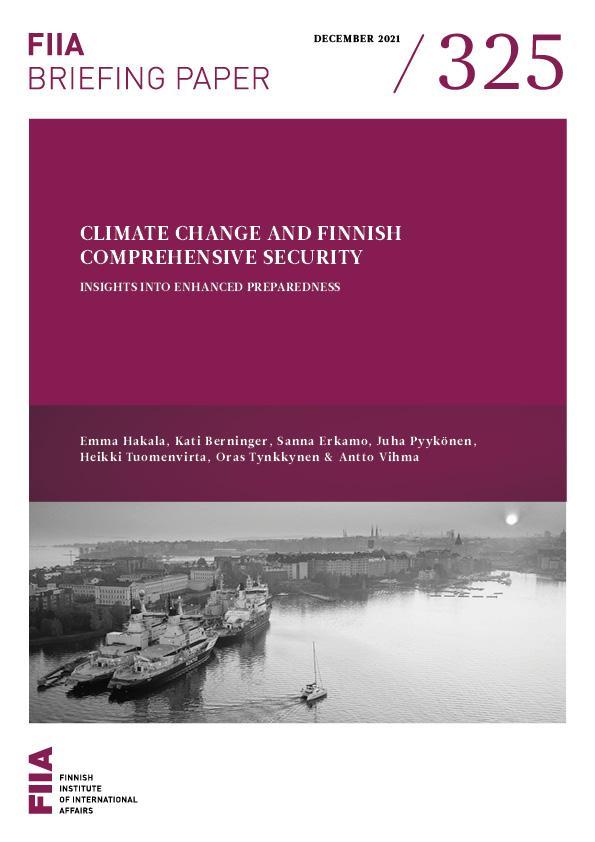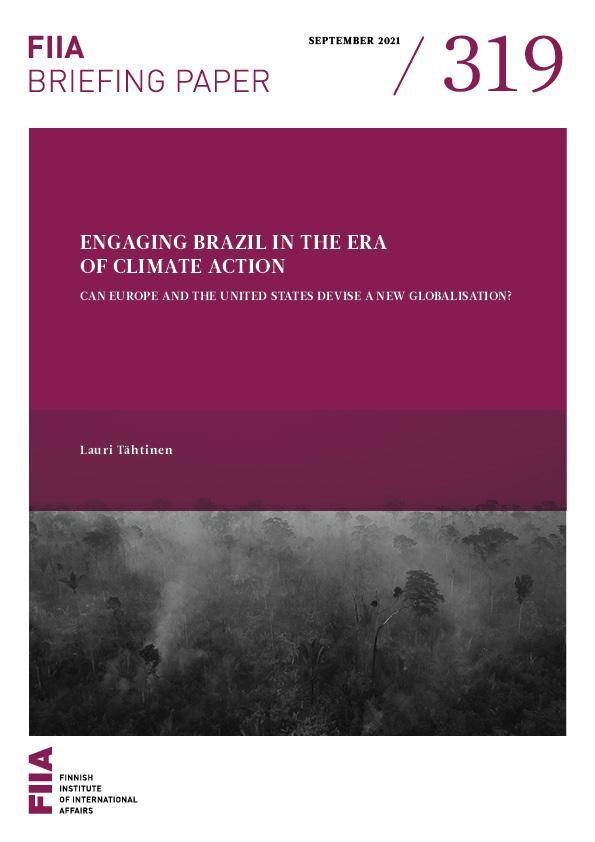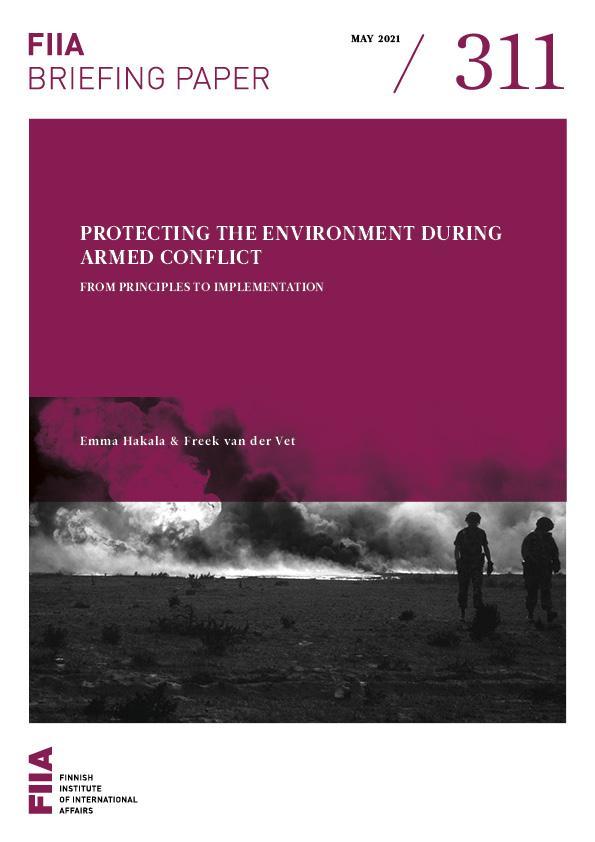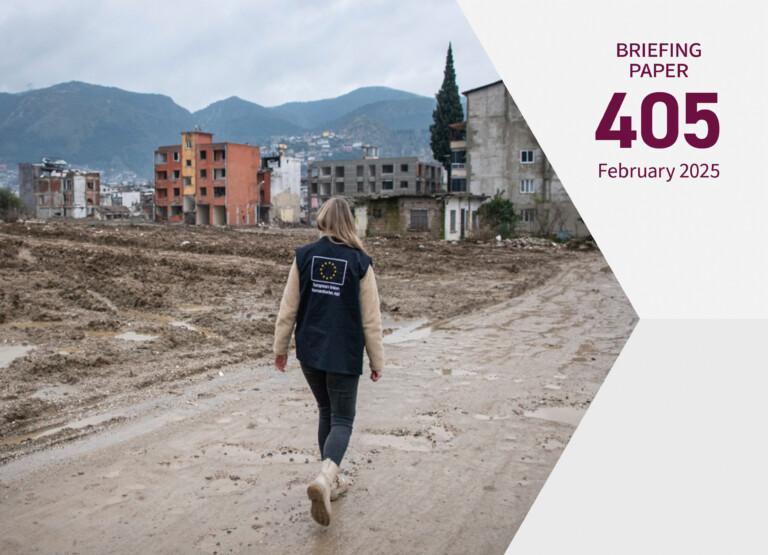
Climate change is already threatening the security and stability of societies in various ways, and the impacts will only be exacerbated in the future.
The security consequences of climate change can be broadly categorised into direct, cascading and transition impacts. Direct impacts refer to the damage to people and infrastructure caused by extreme weather and other climate phenomena, while in cascading impacts climate change is combined with political, economic and cross-border effects. Transition impacts are linked to the adverse consequences of climate change mitigation and adaptation.
It is increasingly imperative to comprehensively integrate climate change into foresight and preparedness activities. In addition to the identification of individual climate security impacts, it is also necessary to identify and continuously monitor broader political and economic developments relevant to climate security.
Cooperation across national borders is important for advancing the climate security agenda. International organisations and individual countries should coordinate and exchange information in order to develop preparedness mechanisms and practices.
Introduction
The threat that climate change poses to people and societies around the world is increasingly clear and imminent. According to the Intergovernmental Panel on Climate Change (IPCC), the increase in extreme weather and climate events, such as heatwaves, heavy precipitation, droughts and tropical storms, causing undesirable health, economic and security impacts, can be attributed to human influence. Climate change has already increased the likelihood and intensity of the kind of extreme flooding that was experienced in Europe during the summer of 2021, and which caused 242 deaths as well as between 2 and 3 billion EUR in reinsurance industry losses.[1] Without major decarbonisation measures, the world will be facing far more severe climate and ecosystem-level disruptions by the end of this century (IPCC 2021).[2] Such consequences will almost inevitably increase the risk of conflict, inequality, forced migration and other kinds of instability.
Although climate change has been recognised as a potential security threat, and has been addressed by the United Nations Security Council (UNSC), concrete policies and action to prevent the associated risks are for the most part missing. This may be due in part to the complex and varied character of climate-related risks, which makes it difficult to outline simple countermeasures. The risks of climate change are not confined by national borders, and in an interconnected and globalised world they are likely to accumulate into complex chains of effects. Yet the specific impacts felt in different regions and political settings may vary considerably. This prompts the need for contextualised analysis and foresight mechanisms in addition to international responses.
This Briefing Paper will consider the preconditions for and obstacles to developing climate security and preparedness in the context of Finland. Although considered to have a relatively high adaptive capacity to climate change, Finland is also a small, trade-oriented country and therefore exposed to global disruptions and systemic risks. As a whole, Finnish preparedness activities are guided by a model of comprehensive security, which aims to ensure the continuity of vital functions of society through wide cooperation between authorities, businesses and civil society. Such an inclusive, multi-sectoral approach provides a solid foundation for enhancing preparedness for climate-related security impacts as well.
The paper draws on the results of a research project commissioned by the Finnish government to consider the consequences of climate change for Finland’s security.[3] The paper will firstly provide an overview of the concept and practice of climate security in an international context, and then briefly outline the main elements of the Finnish model of comprehensive security. It will then discuss potential climate security impacts identified in the Finnish case and the level of preparedness towards them enabled by the comprehensive security model. Finally, the paper will draw conclusions and propose ways to improve current preparedness.
Climate security in an international context
The security implications of climate change have become an established and expanding topic of research during the past decade. While the work initially emphasised the linkages of climate impacts to the onset of conflict, it has also come to cover broader security dynamics through factors such as livelihoods, health, forced migration and geopolitical power relations.[4] The various perspectives illustrate the complexity of climate-related risks, compounded by the fact that they differ from one regional and political setting to another. Recent research has highlighted the need for context-specific analyses as well as for a better understanding of climate change and its mitigation vis-à-vis international relations and geopolitics.[5]
As a policy concept, climate security has gained traction at high levels of international politics. The UN Security Council first discussed the issue in 2007, and has since debated it several times, most recently in 2021 with regard to the role of climate change in conflicts and their prevention. The topic has also become a staple in arenas such as the World Economic Forum, where climate and environmental concerns have been at the top of the list in the Global Risks Report.[6]
Yet the attention has not amounted to equally high-profile and concrete policies or practices. The UNSC debates, for instance, have not led to Security Council Resolutions and have therefore only had limited policy impact. Likewise, a consistent and commonly shared definition or even categorisation of “climate security” is missing. While a strict definition might be excessively limiting for such a wide range of impacts and dynamics, the practical realisation of climate security could benefit from a degree of shared understanding as to what the concept entails.
Despite the absence of an overarching policy approach, some climate security policies have been taken forward. The UN Development Programme (UNDP), for instance, has aimed to address the impact of climate change on human security, while the UN Environment Programme (UNEP) has sought to develop resilience in fragile countries.[7] The UN has also set up a Climate Security Mechanism to promote inter-agency cooperation and enhance risk analysis, response and capacity in the field.[8] Meanwhile, in the United States, climate and environmental factors have featured in military and defence strategies at least since the 2010s, and are increasingly being incorporated into planning and policymaking from the point of view of national security.[9]
In the coming years, climate security is likely to continue to move beyond declarations towards concrete policymaking. However, as the associated risks are not conventional, traditional security policy will not provide all the responses and solutions needed. In particular, there is a need to develop foresight and preparedness mechanisms to take into account potential impacts.
The Finnish model of comprehensive security
Comprehensive security is a central element in Finnish security policy and is based on a model of cooperation among authorities, the private sector, and civil society. In particular, it steers preparedness activities with the aim of ensuring the continuity of the vital functions of society also during disruptions or emergencies. The vital functions are the basic elements that are needed to maintain daily activities in society:
- leadership;
- international and EU activities;
- defence capability;
- internal security;
- economy, infrastructure and security of supply;
- functional capacity of the population and services;
- psychological resilience.[10]
In the comprehensive security model, all actors taking part in coordinated security activities are considered security actors. They are expected to collaborate by sharing and analysing security information, preparing joint plans, and training together. The threat scenarios that inform preparedness include traditional security concerns like the use of military force against Finland, but also less conventional ones, such as a serious disturbance to public health and well-being, as well as major accidents, and weather-related and environmental disasters.
The degree of openness and participation assumed in the comprehensive security model is not self-evident for a security policy approach. Yet previous research has suggested that comprehensive security could provide an ideal platform when it comes to enhanced preparedness for the security impacts of climate change.[11] The model could enable the kind of cross-cutting responses that climate-related risks require. So far, however, this potential has not been wholly realised in practice as the comprehensive security impacts of climate change have not been fully recognised.
Categorising climate security: Direct, cascading and transition impacts
As the variety of possible security impacts of climate change is wide, their identification in specific contexts is difficult. A distinction of some sort between different kinds of impacts is therefore useful. We have thus developed a categorisation of climate security impacts, aimed at enhancing analysis in the Finnish case, but also at contributing to wider conceptualisations of climate security.
In the resulting categorisation, climate security impacts are divided into three groups: direct impacts, cascading impacts and transition impacts (see Figure 1). Direct impacts refer to changes in the physical environment and their consequences for human health and critical infrastructure, such as a storm followed by an extensive power outage. Direct impacts can also take place over a longer period of time, for example when new pathogens emerge due to rising temperatures. However, the dynamics behind direct impacts are relatively straightforward and discernible.
Cascading impacts occur when the environmental changes are combined with socio-economic and geopolitical factors. For example, extreme weather near a critical transportation choke point may cause disruptions in global supply chains, with long-ranging ramifications. Such impacts may be reinforced if they coincide with disputes or antagonism in international politics. Cascading impacts are also linked to economic questions and geopolitical power and competition – the broader developments in the global security environment.
Transition impacts are associated with the mitigation of and adaptation to climate change. These entail both the potentially harmful side effects of individual climate policy measures and the wider, systemic disruptions that may stem from decarbonisation. The transition from fossil-based energy sources is likely to have an impact on major fossil fuel producer countries and potentially weaken their geopolitical position. In domestic terms, on the other hand, inadequately planned decarbonisation measures may increase actual or perceived inequality and thereby contribute to polarisation within society.

Figure 1. Three groups of climate security impacts: direct impacts, cascading impacts and transition impacts.
Climate security impacts for Finland
The following potential climate security impacts for Finland were identified through an analysis combining a literature review and a series of workshop discussions among experts in several relevant fields. The period under study extended to 2035, so changes in the average climate conditions were small compared to natural decadal climate variability, while the main shifts would occur in political and technological development. The resulting summary of identified impacts is not conclusive, but rather presents an overview of some of the potential impacts, and points out critical developments that should be monitored.
The identification of potential security impacts was carried out using the framework for the vital functions of society as detailed in the Finnish Security Strategy for Society. Each of the seven vital functions was analysed with regard to direct, cascading and transition impacts (Figure 2).

Figure 2. Security impacts of climate change.
Due to the three-level categorisation, the analysis produced a range of potential impacts for each vital function (Figure 3). Some impacts are similar, and it is also possible to discern broader developments cutting across several vital functions. For instance, poorly planned climate policy may increase actual or perceived inequality and contribute to societal polarisation, which may threaten leadership, the functional capacity of the population and services, internal security as well as psychological resilience. Meanwhile, both the impacts of climate change itself and climate policy open up new opportunities for hybrid operations, which are a threat to leadership, defence capability and psychological resilience. Moreover, climate-related disruptions to global supply chains may threaten the economy, infrastructure and security of supply, as well as the functional capacity of the population and services.
On the other hand, there are also individual impacts that are directed at specific vital functions but that may also have consequences beyond them. For example, an increase in health hazards caused by climate change poses a risk to the functional capacity of the population and services, but particular health risks such as pandemics may also threaten other vital functions. Likewise, plans for uncontrolled and unilateral geoengineering initiatives initially challenge international and EU governance, but the potential unintended consequences of such actions for the climate and ecosystems on a regional or even global scale could severely impact all vital functions.
Overall, we suggest that the examination of climate security through the comprehensive security model and the vital functions is a fruitful framework as it enables a perspective that is wide enough to trace the full scale of impacts, but still allows for a more detailed focus on specific issues as well. Our analysis supports the presupposition that the security impacts of climate change cut across the various sectors of society and are therefore difficult to contain through any individual policies or measures. This only adds to the challenge of policymaking.
At the same time, we highlight that it is not possible to fully and conclusively identify future security impacts, particularly cascading and transition impacts that are closely linked to political and societal developments. Instead, broader developments with relevance to climate security, such as the ones identified above, should be monitored on a consistent basis and taken into account in foresight and preparedness activities.
While our analysis shows that climate change has been considered at the strategy level and in risk assessments in Finland, its comprehensive consequences — particularly through the cascading and transition impacts — have not been fully recognised.
To improve climate security preparedness in Finland, we put forward the following recommendations:
- Improved cooperation on climate security between different sectors of administration.
- National dialogue to raise awareness of climate security and engage relevant actors in municipalities, the private sector and civil society.
- Coordination of climate security with the National Climate Change Adaptation Plan.
- Enhanced expertise on climate security in different sectors of administration, for example through training or the recruitment of experts.
- More comprehensive and systematic recognition of climate change in foresight and preparedness.
- Consistent monitoring of global developments that could have consequences for climate security.
- Deeper integration of climate change into the strategic planning of comprehensive security.
- More systematic incorporation of climate change into risk assessments.
- Strengthening of crisis management procedures, particularly crisis communications.
Conclusions
In global terms, the realisation of climate security still requires further steps and concerted actions. At the same time, action needs to be taken in various geographical regions and at different levels of governance, from local to national and all the way to international cooperation. However, lessons learned from a specific context can still inform work in other contexts.
The Finnish case mainly focuses on the national level and draws examples and conclusions from the particular political and geographical context of Finland. Yet it can still provide some insights into climate security at a more general level, particularly with regard to foresight and preparedness in practice.
First, new practices and wider conceptualisations of security are needed in order to prepare for the security impacts of climate change. Military solutions and other antagonistic measures associated with traditional security policy do not as such offer the best means to counter climate change, but security actors cannot simply ignore the threats it poses. An enhanced understanding of the associated risks will become a prerequisite for formulating a realistic outlook on the operating environment. Conversely, security actors — as experts in preparedness — can crucially contribute to the development of the climate security agenda. On this issue, the security sector could benefit from increased openness and interaction, integrating climate expertise and civil society perspectives.
Second, climate change needs to be comprehensively integrated into foresight and preparedness activities. This recognition needs to consider the range of direct, cascading and transition impacts and their different consequences for the operating environment. Rather than merely attempting to predict individual impacts, it is also necessary to identify and continuously monitor broader political and economic developments relevant to climate security.
Third, international cooperation is crucial for advancing climate security and preparedness. As the security impacts of climate change are overwhelmingly transboundary, they cannot be effectively tackled without coordination across national borders. Through cooperation and information exchange, individual states may also stand to gain from more effective foresight and preparedness measures regarding climate change. Meanwhile, international organisations working on climate security could benefit from increased coordination to streamline their activities and come up with new practices.
ENDNOTES
[1] Kreienkamp, F. et al. (2021). ‘Rapid attribution of heavy rainfall events leading to the severe flooding in Western Europe during July 2021’. World Weather Attribution.
[2] IPCC 2021.
[3] Hakala, E., Erkamo, S., Pyykönen, J., Tuomenvirta, H., Tynkkynen, O., Berninger, K. & Vihma, A. (2021). ‘Ilmastonmuutos ja Suomen turvallisuus: Uhat ja varautuminen kokonaisturvallisuuden toimintamallissa’ [Climate change and Finland’s security: Threats and preparedness in the model of comprehensive security]. Publications of the Government’s analysis, assessment and research activities 2021: 52, https://julkaisut.valtioneuvosto.fi/handle/10024/163384.
[4] McDonald, M. (2021). Ecological Security. Cambridge University Press.
[5] Selby, J. (2014). ‘Positivist climate conflict research: a critique’. Geopolitics, 19(4), 829-856; Dalby, S. (2020). Anthropocene geopolitics: Globalization, security, sustainability. University of Ottawa Press.
[6] World Economic Forum. ‘The Global Risks Report 2021’. 16th Edition, https://www.weforum.org/reports/the-global-risks-report-2021.
[7] UNDP. (2020). ‘The climate security nexus and the prevention of violent extremism: Working at the intersection of major development challenges’. UNDP Policy Brief, https://www.undp.org/publications/undp-climate-security-nexus-and-prevention-violent-extremism; UNEP, EU & adelphi. (2019). ‘Guidance Note: Addressing Climate-Fragility Risks. Linking peace-building, climate change adaptation and sustainable livelihoods’, https://www.unep.org/resources/toolkits-manuals-and-guides/addressing-climate-fragility-risks?_ga=2.99408734.1512817352.1623777619-9798287.1622120807.
[8] Born, C., Eklöw, K. & Mobjörk, M. (2019). ‘Advancing United Nations Responses to Climate-related Security Risks’. SIPRI Policy Brief, https://www.sipri.org/publications/2019/sipri-policy-briefs/advancing-united-nations-responses-climate-related-security-risks.
[9] Busby, J. W. (2016). ‘Climate Change and US National Security: Sustaining Security Amidst Unsustainability’. In: Sustainable Security: Rethinking American National Security Strategy. Edited by Suri, J. & Valentino, B. The Tobin Project.
[10] Prime Minister’s Office. (2017). ‘The security strategy for society’ (Government Resolution 2.11.2017).
[11] Räisänen, H., Hakala, E., Eronen, J. T., Hukkinen, J. I., Virtanen, M. J. (2021). ‘Comprehensive security: The opportunities and challenges of incorporating environmental threats in security policy’. Politics and Governance, 9(4).










